Editor’s note: This review of Larks on a String was originally written by L.K. Weston for the film’s 2011 DVD release, and has been reposted here with the author’s kind permission because it absolute nails what makes the film so special. The same goes for the special features carried over from the DVD, while the HD transfer and the extras that are new to this edition have been covered by Slarek. The final summary combines comments from both.
| |
How can the bird that is born for joy, / Sit in a cage and sing?" |
| |
From, 'The Schoolboy' by William Blake
in Songs of Experience (1794) |
| |
"The good old days are draining away. This era has crushed you. What do you intend to do?" |
| |
The Professor |
Fate is a cruel mistress, and there's many a director who has seen their creations banned, shelved to a dusty oblivion or in some cases burned for daring to speak out against the tyrannies of an unjust political regime. All too rarely do their films see the light of day and reach the wider audience they so obviously deserve. However, there are twists of fate too. In the passing of years, ideologies can change; dictators can be overthrown and the kind of just governments thought to be a pipe dream in the 1960s are a reality in the 1990s.
For Jiří Menzel, perhaps one of the most famous directors of the Czechoslovak New Wave, it took over 20 years for his film Skřivánci na niti/Larks on a String to obtain a theatrical release at the Berlin Film Festival in 1990, but, in addition to long overdue praise, then he was rewarded with The Golden Bear. Made during an all-too brief period of liberty in 1968, it was banned shortly after its completion when the Communist regime was restored in the aftermath of the Soviet invasion. Menzel's long-time collaborator, cinematographer Jaromír Ŝotr, fought to save the film they'd worked so on, cutting the sequences deemed most offensive, thereby allowing it to be seen by some audiences. As a result, it would not be shown as originally intended until those scenes were reincorporated from a work print before its Berlin premiere.
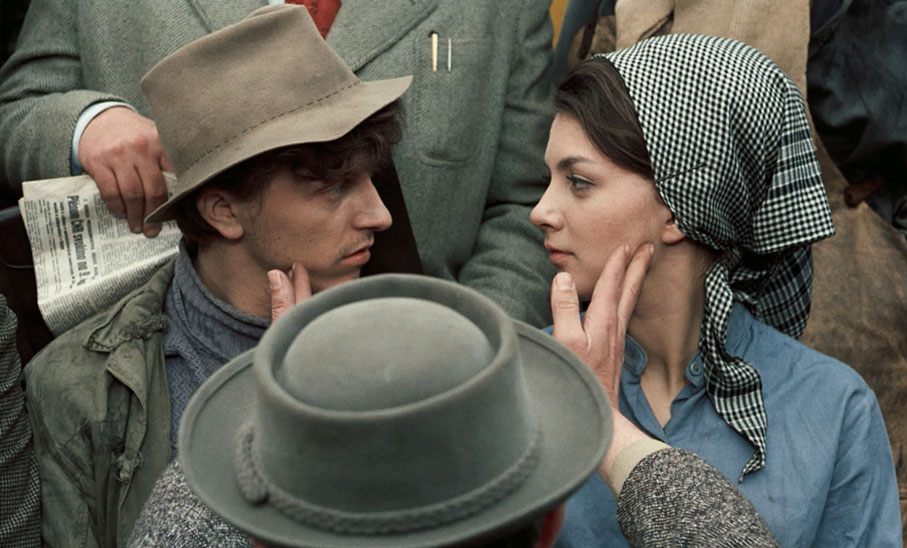
Larks is the third of Menzel's six films borne from his creative partnership with acclaimed writer Bohumil Hrabal (the most famous of which being the Oscar-winning Ostre sledované vlaky/Closely Observed Trains) and is based on his collection of short stories Inzerát na dům, ve kterém uz nechci bydlet/Advertisement on a House I Do Not Live in Anymore, published in 1965. The film's title comes from an earlier collection of stories that were abandoned before publication, and the image it conjures is particularly fitting for a country that continuously suppressed its people for so many years, but also for a film with such a turbulent history.
So often, art speaks for people when they cannot or dare not, for fear of reprisal. Larks does that, and more, by speaking loud and clear through its band of brave misfits, members of the bourgeoisie working in a scrap yard in the town of Kladno in Prague, after the working-class uprising of 1948. Thrown together by circumstance in the name of re-education, the group includes a philosophy professor and former librarian (a wonderful Vlastimil Brodský, who also starred in Closely Observed Trains), who refuses to burn books; a prosecution lawyer (Leos Sucharípa) who believes in everyone's right to a defence; a saxophonist (Eugen Jegorov) whose only crime was possession of an instrument deemed too bourgeois; and a young cook Pavel (Václav Neckár, another Trains cast member) who is a Seventh-day Adventist and refuses to work on a Saturday. The only willing volunteer in the group is dairyman (Vladimír Ptácek), who closed his premises and came to 'work for Socialism.' Watched over by a suited foreman (a great Rudolf Hrusínský, star of Juraj Herz's Spalovač mrtvol/The Cremator and Menzel's earlier comedy Rozmarné léto/Capricious Summer), who consistently extols the virtues of work, they try to carry on as best as they can, fighting against the consistent demands of their work, forming friendships with each other and the women on the other side of the yard. Over time, the group slowly diminishes in number as they're punished for dissent.
Though comedy is Larks' chief mode, there are times when it bites back; such as the constant mockery of authority figures and dignitaries and/or the absurdity of the group's situation, but it never veers too far, and retains a sense of balance between dark and light. On the occasions when it does visit the lighter end of the comedic spectrum, it's not remotely throwaway, nor does it make light of a politically and socially bleak period. Instead, it uses comedy as a form of social commentary – and as a way to bring emotional lightness; to round out these characters and make them human, itself a typical feature of Hrabal's writing. Some of the film’s lightest and sweetest moments come in the form of the romance between Pavel and Jikta (Jitka Zelenohorská), the youngest of the women on the yard. He's thoroughly clueless as to how to woo her, and often makes a fool of himself (with some lovely Chaplinesque slapstick) because of it, but that only seems to make him more endearing. A great compliment to this is the marriage of the women's guard and his Gypsy wife. After a farcical wedding reception (the perfect marriage of the comic and the tragic) descends into chaos, he finds he's equally ill-equipped to understand his new bride. It all hangs together beautifully, thanks to the skill Menzel, Hrabal, Ŝotr and a charming score from Jirí Sust.
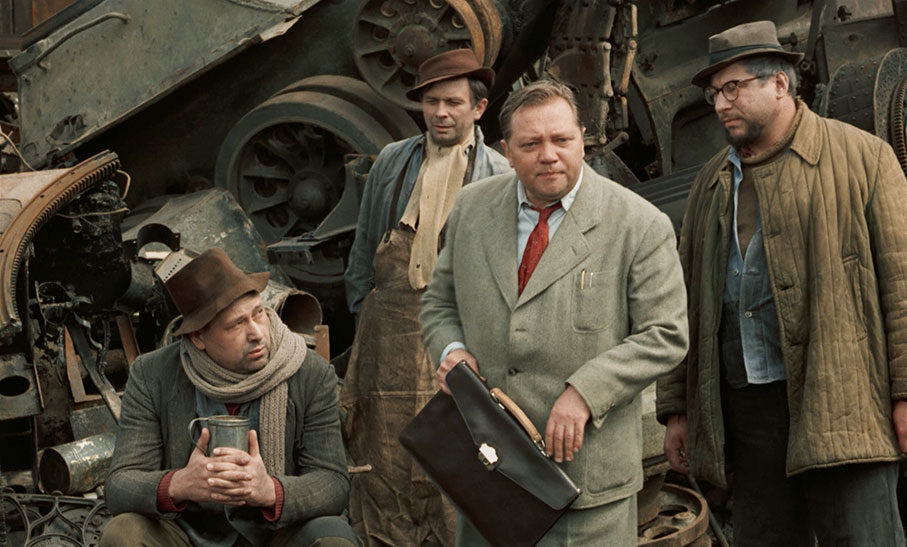
In fact, when the genuinely bleak and foreboding moments do rear their heads, it makes the contrast been the different kinds of material all the more stark. Beyond the dark palette of the film itself and the rusty landscape – captured beautifully by Ŝotr – the constant references to man as machine are particularly frightening. You can't help but recall the opening moments of Fritz Lang's seminal Metropolis, with the worker and the clock as the group sort metal, passing it in a human chain, or Sergei Eisenstein's Stachka/Strike, as the men dangle from pipes and other bits and pieces. Shot from above, cast in the shadow of the giant machine's they feed, they look tiny and insignificant; strewn through the yard like the worthless discards their superiors deem them too be. Perhaps the most sobering image of all (barring the film's last scenes) is the proclamation of the foreman when he declares that everyone is there to be reformed, which involves them being 'melted down into a new kind of people.' It's a bold message, a terrifying message even, but it's also a warning to those watching to stay strong in the face of adversity, and not to lose the very things that make them human: to love, to laugh, to be free. Then, and only then, are you the man instead of the machine.
Fate saw to it that Larks on a String is yet to receive the attention it so richly deserves, and while it might not be as well-known as Closely Observed Trains or Capricious Summer, it more than lives up to their high standard. The reputation it's already amassed only goes to show that this little bird could only be confined for so long. Now it has the freedom to spread its wings and fly.
The transfer on Second Run’s new Blu-ray edition was sourced from a new digital restoration carried out by Karlovy Vary International Film Festival in collaboration with the Národní filmový archiv, Prague, and the Czech Film Fund in UPP and Soundsquare. The original image and sound negatives, preserved by the Národní filmový archiv, were used as the source for the restoration. The results are just superb, with sharply defined detail that never feels digitally enhanced, and beautifully balanced contrast, with solid blacks, cleanly rendered highlights, and a perfectly pitched range of tones between. The film’s almost rust-infused industrial colour palette is handsomely rendered, the image is clean of any dust spots or signs of wear, and a fine film grain is visible throughout. There is a very slight softening of the sharpness in a late scene that was originally cut from the film (some detail is provided on this in the commentary), but this is negligible given the quality of the image elsewhere. This represents a serious improvement on the transfer on the 2011 Second Run DVD release, and the film is also presented here in its original aspect ratio of 1.66:1, as opposed to the 1.78:1 image on the DVD.
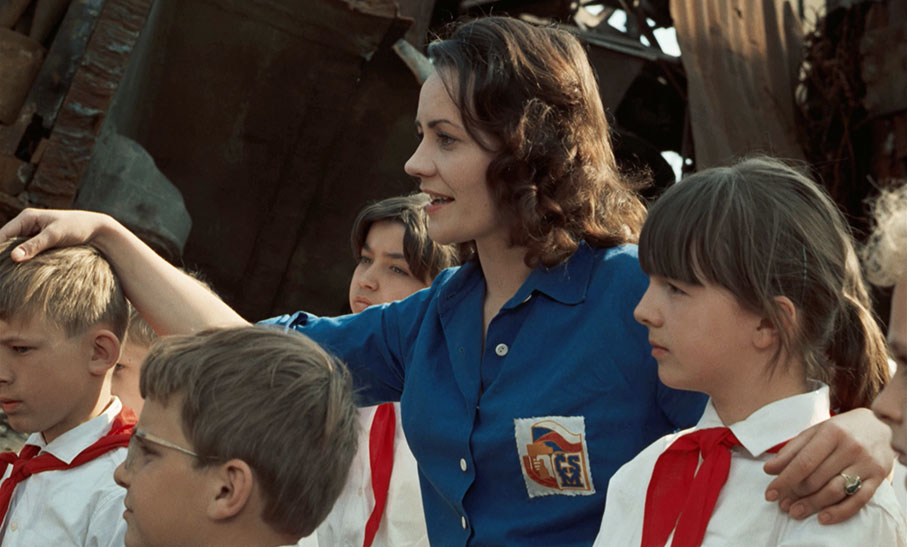
The original Czech soundtrack, also restored from the original materials, is presented as a Linear PCM 1.0 mono track, and is also in excellent shape, with clear reproduction of dialogue, music and the all-important sound effects. Unsurprisingly for a film of this vintage, there’s little in the way of bass response and some slightly sharp trebles, but this is still an excellent restoration that betrays no signs of any former wear.
Optional English subtitles kick on by default but can be disabled if you so wish.
As noted at the top of this review, the special features that have been caried over from the previous DVD release – Jiří Menzel: 7 Questions and the booklet – have been reviewed by L.K. Weston. The special features new to this release – the audio commentary, Jiří Menzel on Larks on a String, the short film Our Dear Mister Foerster Died and the trailer – have been reviewed by Slarek.
The Projection Booth Audio Commentary
Mike White and Jonathan Owen of The Projection Booth podcast deliver a most engaging and informative look at this key work by one of the leading lights of the Czech New Wave. A lot of ground is covered here, including director Jiří Menzel, source novel author Bohumil Hrabal, how the party sloganeering counterpoints the fate of the characters, the symbolic role of objects within the junkyard and the story arcs of individuals, the figurative representation of sex and romance, and much more. They opine that some elements have not aged as well as others, with the suggestion that the women are there to be looked at and do the work while the men take time out to philosophise, and both criticise what they see as the slightly patronising presentation of the Romany woman on her wedding day. Owen draws comparisons with Menzel’s earlier Ostre sledované vlaky/Closely Observed Trains, and after praising so many elements of the film, White admits that it doesn’t work as well for him as other works by the same director, which does spark an intriguing discussion between the two over why this could be. We also get a timeline of the film’s release, the censoring of scenes and the later restoration, and director Menzel’s brief late film cameo is handily pointed out. A most useful and enjoyable companion to the film.
Jiří Menzel: 7 Questions (9:33)
Filmed by the man himself, this brief Q and A session (or rather A, because we never learn directly of the questions Menzel has been asked) brilliantly showcases his humour and wit in high style, as he shares details of his background, the making of Larks, and the changes he's seen within the film industry over the years. If you've always thought that directors are brooding serious types, then this will prove you wrong, and it shows where some of the humour in Larks may have originated. A great deal of fun and educational too!
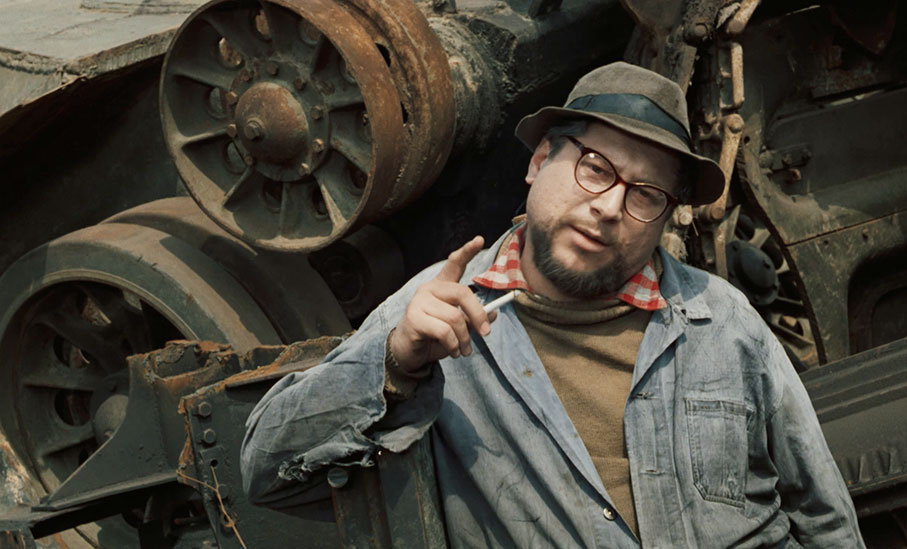
Jiří Menzel on ‘Larks on a String’ (9:48)
Compiled from unused footage from Shivendra Singh Dungarpur’s wonderful 2018 documentary CzechMate: In Search of Jiří Menzel (also available on Second Run Blu-ray), Menzel here talks about Larks on a String whilst lounging comfortably on a wooden floor in his house. He outlines the political situation in Czechoslovakia that saw author Bohumil Hrabal’s books banned, and how the ruling regime’s approach to censorship softened over time and disappeared completely when Alexander Dubček became First Secretary, only to be soundly imposed again a short while later following the Russian invasion. He explains how an old joke about communism informed the structure of the film, and tells an amusing story of how he crashed his new Saab whilst driving to the location one morning. He also states that when filming he feels both excited and afraid, and that the trick is not to let the fear become greater than the excitement. Spot on.
Our Dear Mister Foerster Died (15:25)
A grey-haired man sits in in the sun recalling childhood memories while captivated by the surrounding nature, and the arms, legs and voice of a younger female neighbour as she hangs out her washing and sings. He talks about his desire to visit the places in France where Renoir used to paint, then has his serenity disrupted by the news that a respected local man named Mister Foerster has died. A poetic, quietly meditative short film from 1962, directed by Jiří Menzel and based on a story by Jindriska Smetanová, that feels less about telling a story than capturing that whistful sadness we sometimes feel for aspects of our past lives, our unfulfilled dreams, and what we all ultimately stand to lose. Shot in radiant monochrome by Petr Mares and Jozef Ort-Snep, it clearly also been restored and looks pristine here.
Trailer (1:21)
Less a trailer in the traditional sense than an extract selected to give a flavour of the main setting and the philosophising of some of the male characters. This was created specifically to promote this new restoration.
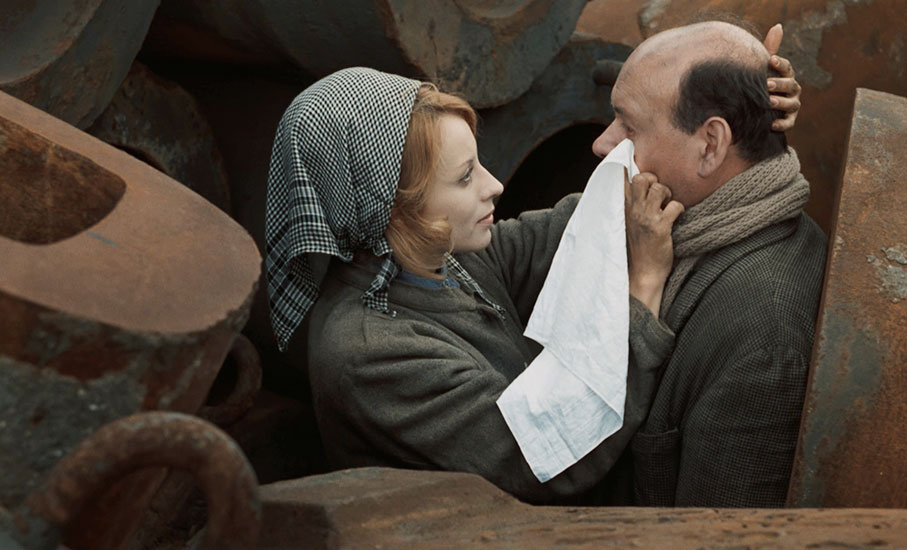
Booklet
Featuring an introduction by celebrated director of photography for Larks, Jaromír Ŝotr – a frequent collaborator of Menzel's (and many other filmmakers of the Czech New Wave including Jan Němec) – alongside an new essay from Peter Hames, film historian, author of The Czechoslovak New Wave (amongst other titles) and regular Second Run contributor. This booklet is, as ever, the icing on the cake. Ŝotr's words are warm and jovial, with more than a moment's pause for thought as he reflects upon his experiences of making Larks with Menzel, during a brief period of political liberation, and their subsequent struggle to restore the cut when under the shadow of the restored Communist regime. The Hames essay that follows is a wonderful compliment. As you'd expect if you're a regular reader of Hames' work, this is a meticulously written and referenced piece that concentrates chiefly upon the working partnership between Menzel and writer Bohumil Hrabal throughout the years, chronicling their many creative endeavours, including Closely Observed Trains and of course, Larks. A fascinating read.
Larks on a String is a beautifully crafted and sharply observed film that balances satiric, comedic, and romantic tones with enviable deftness. This celebration of nonconformity and triumph of the human spirit perfectly showcase the formidable talents of Jiří Menzel and the late Bohumil Hrabal both, and is here given the sort of makeover that it has for so long deserved. A terrific restoration and some excellent special features make this a must-have for all world cinema devotees. Highly recommended.
|